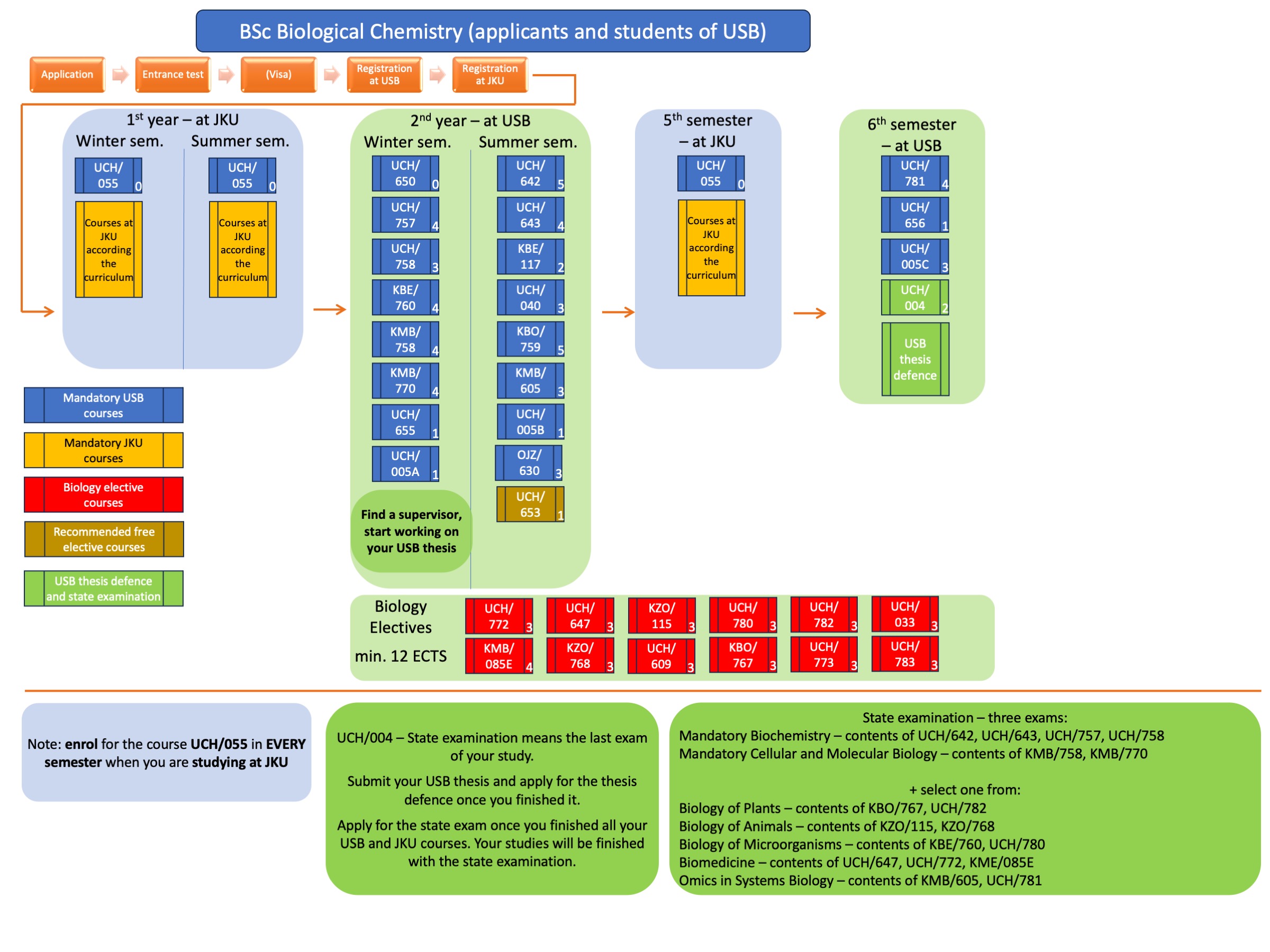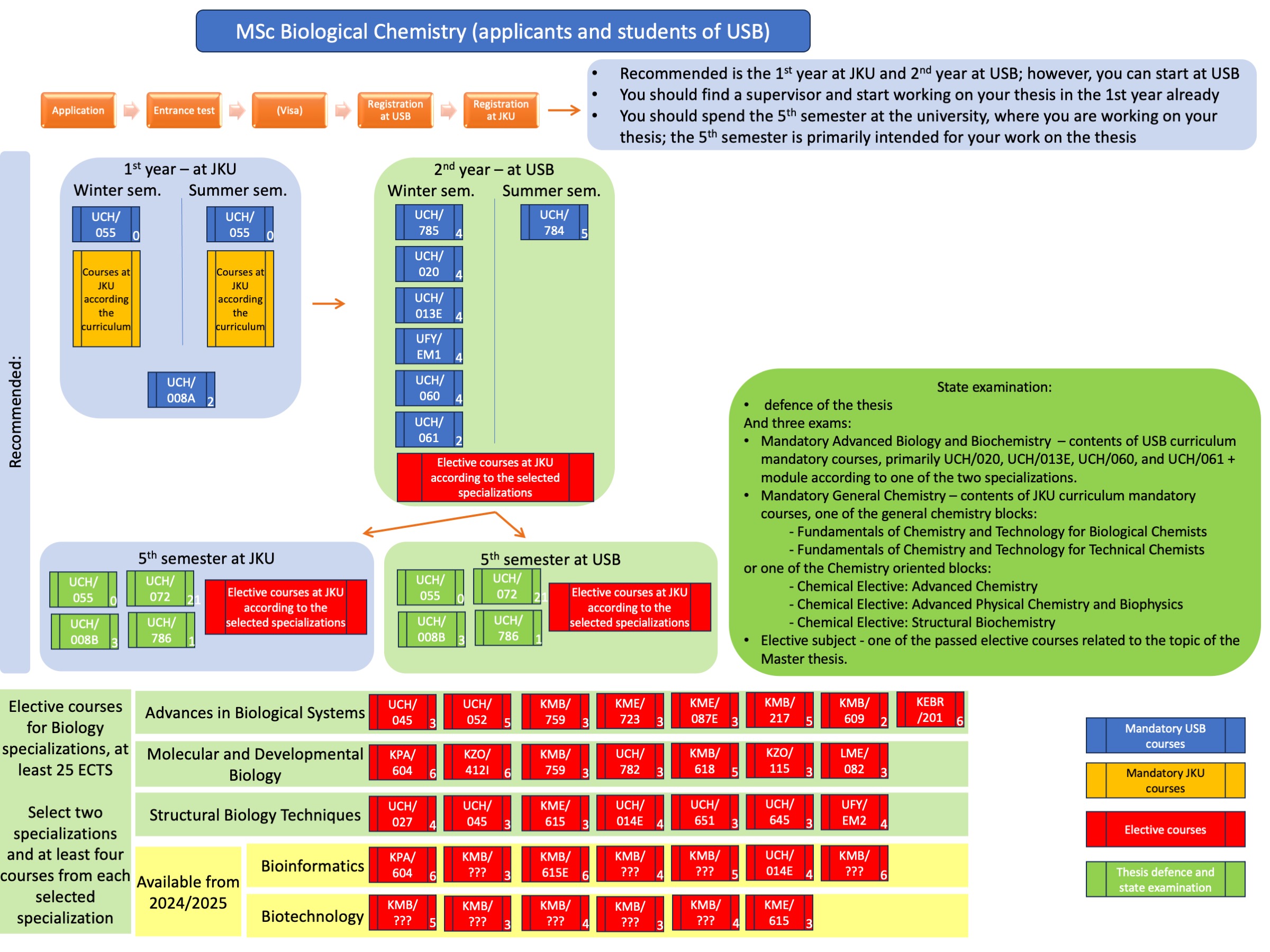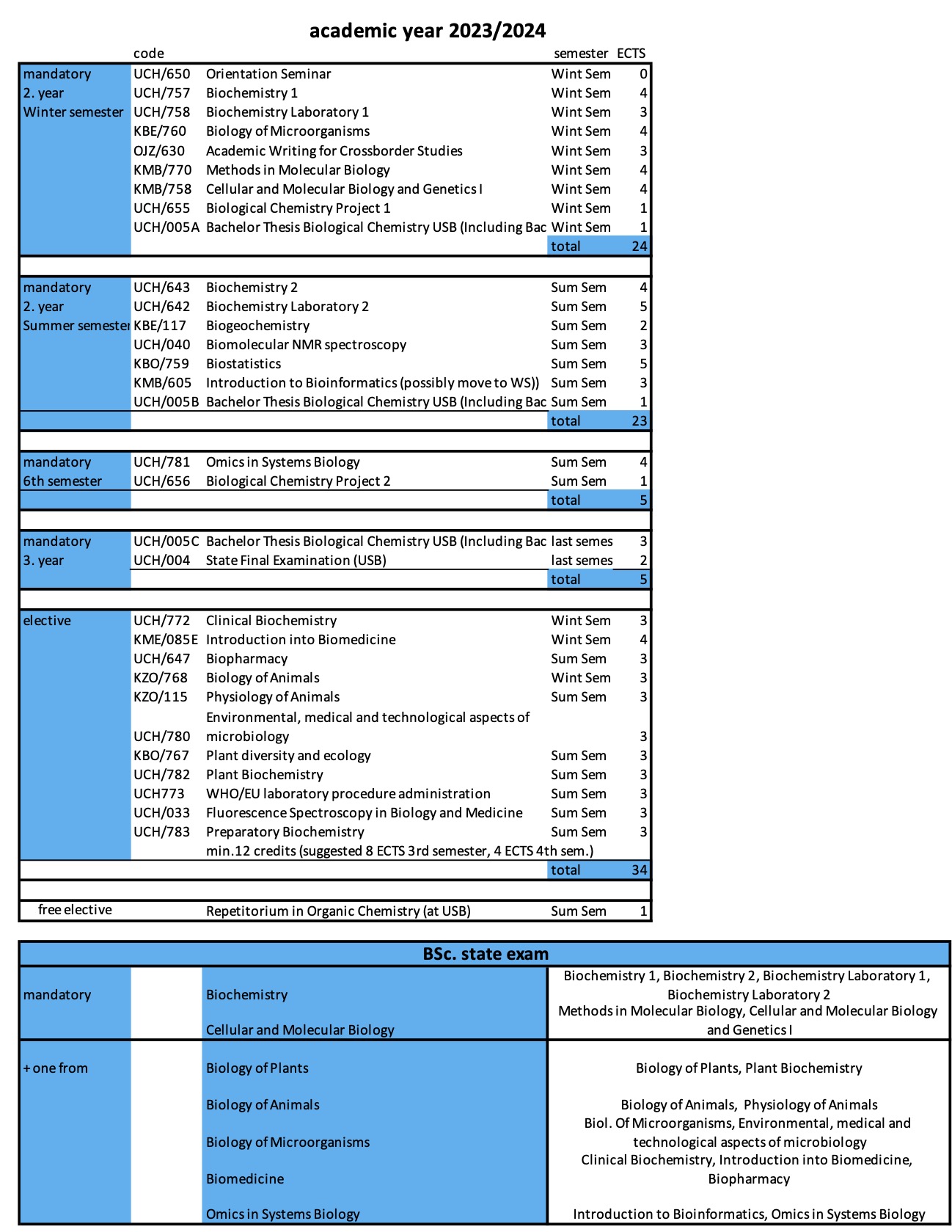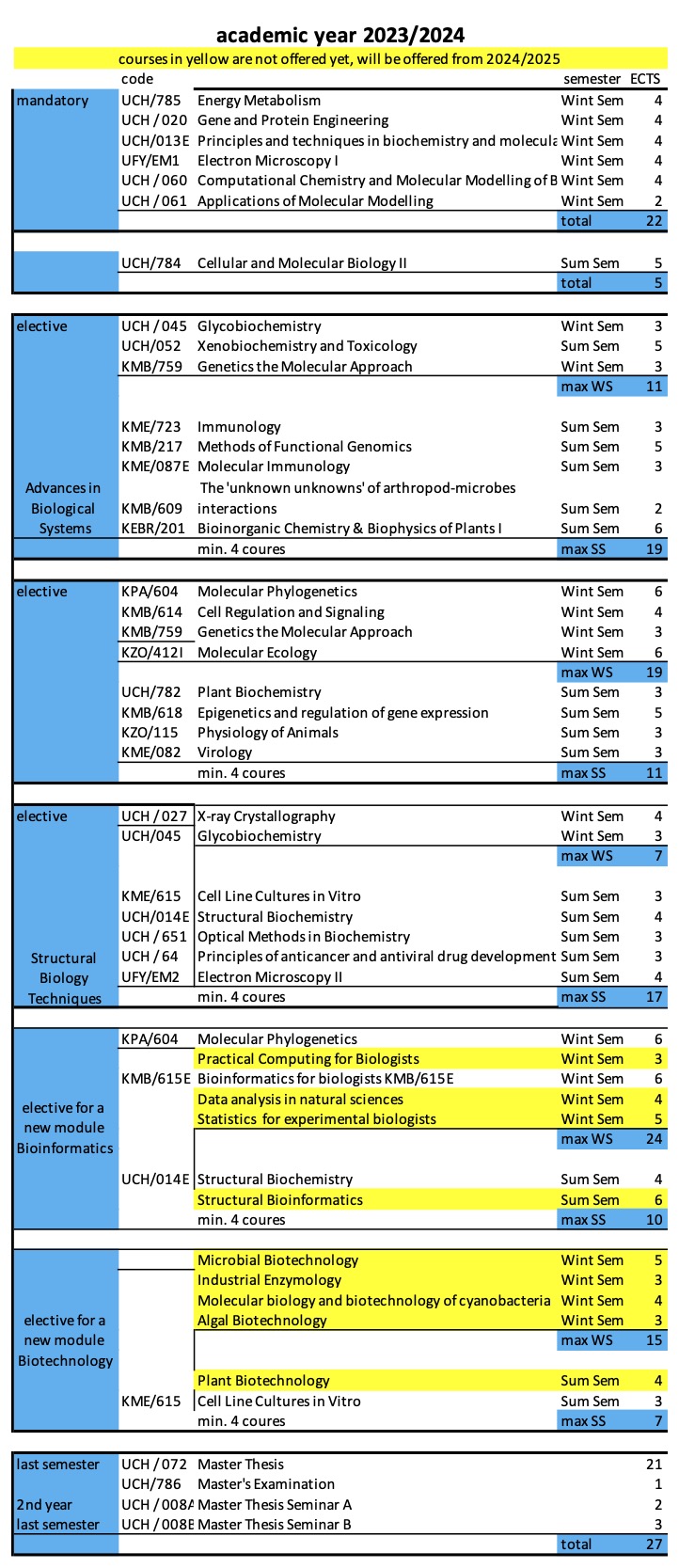FAQs Biological Chemistry study programmes
Frequently asked questions regarding the Biological Chemistry study programmes.
-
Sport courses at USB
You can choose one sport activity in the winter semester and one in the summer semester (only these two activities in your bachelor's or master's study)
You can see the list of activities in STAG – course KTS/VTVZS in the winter semester and KTS/VTVLS in the summer semester.
You can enrol these courses during electronic enrolment or later, at the time of confirmation of electronic enrolment (this time via reg. List B)
If you wish to register for this course later (up to 3 weeks after the start of the teaching period), you have to send an email to the Department of Student Affairs describing which course you would like to enrol, when and pay the fee for late enrolment of this course (according to current price list Deans decision D69).
After payment, the Department of Student Affairs will enrol you on this course.
If you wish to register for any sport course later than three weeks after the beginning of the teaching period, you have to apply via STAG, pay the fee (according to the current price list, Deans's decision D69), and the Vice Dean has to approve your request.
-
Payments & stipends
Czech banks use bank account numbers, Specific symbols (SS) and Variable symbols (VS).
International payments have a bank account number and reference number – therefore, use the Specific symbol (SS) as a reference number. As a note, mention your name and variable symbol (VS).
If you receive a stipend (for studies, a special stipend for attending a course or from your supervisor for an excellent bachelor thesis), it can be paid only to a Czech bank account. It can be paid in cash at the rectorate’s cashier's office if you do not have one.
-
Enrolment
You must enrol courses every semester in our study system STAG
1/ choose your courses according to the study plan.
2/ enrol for courses in your STAG account for the next semester (the deadline is in the academic calendar, about the first two weeks in June for the winter semester and 9-20.1.2023 for the summer semester.
If you forget – the process of termination of your study will start. Stopping administrative procedures is not claimable. However, you can ask the vice dean to stop it by sending a request via STAG. (currently without fee, may be subject of change, previously the fee was 200 CZK) Attach the form with the list of courses you wish to add.
3/ confirmation of enrolment (dates in the academic calendar) If you wish to change a list of selected courses before the start of the semester– send the Registration list B with marked changes to the Dept. of Study Affairs (Mrs Trefna). It can be done by hand, and it's free.
If you don't need to change anything - no further action is required.
4/ if you need to change your list of courses within the first three weeks after the start of the semester (currently without fee, may be subject of change, previously the fee was 80 CZK) and send your request via email to the Department of Student Affairs (jtrefna (at) prf.jcu.cz)
5/ If you need to enrol or delete any course later than the first three weeks after the start of the semester – you have to apply via STAG and the Vice Dean has to approve it (currently without fee, may be subject of change, previously the fee was 150 CZK). A form must be enclosed to the request and also attach the teacher's consent to the additional enrolment of the student in the selected course.
6/ You need to enrol course UCH/055 Study placement at USB every semester which you spend at JKU!
7/ Do not forget to enrol for all the mandatory courses such as the Orientation Seminar (UCH/650), Bachelor (UCH/005A, B,C) and Master Seminars (UCH/008A, B)
-
ERASMUS
Responsible person for Erasmus – Mrs. Barbora Okosy (bokosy (at) prf.jcu.cz)
Department of Study Affairs is not involved in ERASMUS-related topics
-
Transcript of Records (ToR)
The Transcript of records at JKU is the same report as Summary of Students data at USB.
The Summary of Students Data is sent to JKU automatically after the check of study of previous academic year, 3rd or 4th week of October.
-
Finishing your studies
- you must apply for a defence & state exam (can be separate terms)
- there are defined terms for the state exams and defences – three times a year for Biological Chemistry students (January/February, May/June, September) - check the Academic Calendar for crossborder studies
- check info about your university accounts (e-mail, STAG ...) https://www.prf.jcu.cz/cz/fakulta/katedry/katedra-chemie/pro-studenty?view=article&id=1672&catid=66
- graduation ceremony is organized twice a year. This is an official ceremony where you will receive your diploma (and possibly awards), and your family is welcome to celebrate your studies end.
- MSc students: do not enrol for the UCH/072 Master Thesis – this course is automatically credited to you after the successful defence and state exam
-
Presentations and seminars
You should present the results of your thesis (at the beginning of your work on the thesis, only the background, aims, planned experiments etc.):
- during your BSc studies
- once in the second year (courses UCH/005A and UCH/005B), once in the last semester before the defence (course UCH/005C) at the seminars organized by the Department of Chemistry
- during your MSc studies
- if you work on your MSc thesis at USB: once in the first or second year (UCH/008A), once in the last semester (UCH/008B) at the seminars organized by the Department of Chemistry
- if you work on your MSc thesis at JKU: once in the first or second year at the seminars organized at JKU – presenting should be confirmed by the responsible person from JKU to J. Štěrba once in the first or second year (UCH/008A), once in the last semester (UCH/008B)
You must enrol for these courses to get the credits and fulfil this obligation (these are mandatory courses).
Presentations at the Department of Chemistry are mandatory. Your supervisor can ask you to present also at the seminars of her/his department. Do not take this as a complication - the more you present, the better and simpler your defence will be. You can present during the seminars even more times than the required minimum.
-
UCH/072
You should enrol for the course UCH/072 in the semester of your master studies when you are going to defend. You must get the credits before the defence and state exam. This course is credited if your supervisor is satisfied with the submitted master thesis.
-
E-mailová schránka končících studentů/E-mail account of finishing students
-

Scheme B Sc Biol Chemistry From 2023
-

Scheme M Sc Biol Chemistry From 2023
-

Table B Sc Biol Chemistry From 2023
-

Table M Sc Biol Chemistry From 2023
Číst dál …FAQs Biological Chemistry study programmes
- Přečteno: 1228